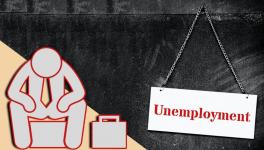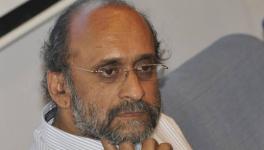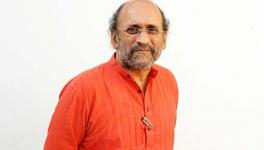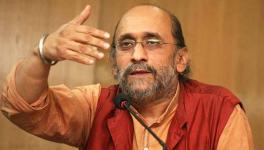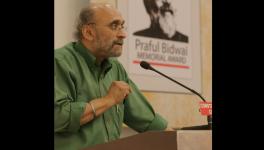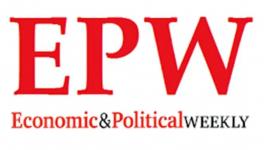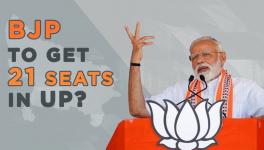“... Seems Like it is Part of a Bigger Agenda to Malign Me Personally” – Paranjoy Guha
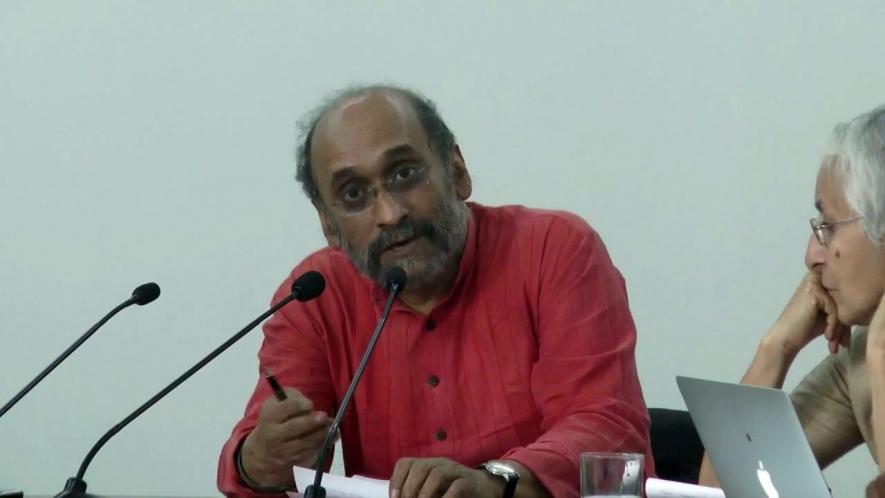
I have agonised for days about whether I should put out this statement, ever since the letter dated 25 July, 2017, sent by eight of my former colleagues in the Economic and Political Weekly (EPW) to the trustees of the Sameeksha Trust, owners and publishers of the EPW, entered the public domain soon after it was sent. This was a letter that was not meant to have reached me. But now that it is circulating widely, I have decided it is time to respond. My silence on the points raised in the letter have been interpreted by some as my tacit acknowledgment of the claims made by some of my former colleagues. This is far from correct.
On the issue of my allegedly undermining the review process in the EPW, I wish to assert that I exercised my prerogative as an editor to shorten the review process in the cases of barely a handful of articles out of the hundreds of articles that were published in the print and web editions of the EPW in the 15 months that I was privileged to serve in this position. I wish to place on record that among this handful of articles was one that was strongly recommended for publication by one of the Trustees of the Sameeksha Trust. After this article was published, it attracted a strong rejoinder which too was published. The same Trustee also wrote an email to me expressing unhappiness at the rejection of a particular article. While it is not normal practice in the EPW to specify the reasons for rejecting an article, in this instance, because a specific complaint had come from a Trustee, I requested the reviewer to specify the reasons for rejecting the article. These reasons were then emailed to the Trustee who retorted with a harangue questioning the decision of the reviewer. I wish to, therefore, categorically deny the claim that I have undermined the review process in the EPW.
On the claim that I favoured my close associates by promising to pay them substantially more than what the EPW normally pays its contributors, the following facts should be noted. One particular investigative article by Subir Ghosh (my co-author and close associate) on the cartels that were apparently responsible for the spike in the prices of tur and urad dal was published on the website of the EPW. This article was written after more than a month of research based on a perusal of thousands of pages of documents that were leaked to me by a whistleblower. Another article on Kingfisher Airlines by Nihar Gokhale (a freelance journalist who could become my close associate) was published on the EPW website based on leaked internal documents of a bank. I proposed a payment of Rs 30,000 and Rs 20,000 respectively for the two authors of the two articles which I felt would be commensurate with the efforts they had put in. These were not the typical articles contributed to the EPW for which the authors are paid token amounts. The articles were specially assigned. An important point to note in this context is that the EPW recently received a generous grant from a foundation for its digital edition and one component of this grant was specifically meant for "corporate investigations" and "web exclusives" for which a separate budget has been earmarked. Nevertheless, I had in addition raised a sum of Rs 50,000 from an individual as a donation for corporate investigations. This person subsequently withdrew his donation on learning about my resignation. At this point of time, neither Ghosh nor Gokhale have been paid the amounts I had "promised" them.
On the question of the editor writing signed articles, from the day I joined the EPW as editor on 04 April 2016 till the day I resigned 15 months and 15 days later, eight articles written and/or co-authored by me have been published in the digital and/or print editions of the EPW. I have never been ashamed of the fact that for the forty years I have been a journalist, I have been a reporter for much of the time. Over and above the articles I authored or co-authored, I had during my tenure as editor been responsible for publishing close to two dozen articles that may be described as "investigative" in nature. I wish to state that not only did these articles attract more than the usual number of readers to the website of the EPW, but also that not a single fact published had to be retracted or were contradicted. My former colleagues refer to an article on alleged over-invoicing of imported coal by prominent private and public companies that I published on the very first day I joined the EPW. That was also the day I received a copy of a document (on which the article was based) that had been sent to 50 different government establishments. I wanted the EPW to be the first to publish the news and indeed, after the EPW published the report, it was picked up by a number of Indian and international dailies and publications.
It has also been alleged by my former colleagues that I had compromised the "egalitarian" work culture in the EPW. They are indeed entitled to their opinion. I do not agree with them. I believe I did try and accommodate the viewpoints of my former colleagues even when I vehemently disagreed with them. It is up to the larger community of the EPW to evaluate the contribution I made to this reputed publication.
What has pained me the most is the claim that I have on occasions used inappropriate and sexist/sexual language in office. On only one (repeat one) occasion, did I inadvertently use a phrase in a conversation with a woman colleague that may have been considered inappropriate. On realising this, I immediately apologised to her. Later in the day I followed it up with an email to her placing on record my apology for what I had said. I cannot prove what I have stated as my email account with the EPW has been suddenly blocked. It is important to note that if my way of functioning with my women colleagues in office had on occasions caused them discomfort as is being alleged in the letter to the Trustees, I am not aware if any formal complaint was ever made. That this is being made an issue now seems like it is part of a bigger agenda to malign me personally.
I am taking particular umbrage at the decision to suddenly block what used to be my official email account. This is contrary to the explicit assurance that had been given to me that I would be allowed access to my EPW email account for a few weeks after my resignation from the post of editor of the EPW on 18 July. I sincerely hope that what is contained in my EPW email account will not be tampered with. I also hope I will still be given an opportunity to access my email account to retrieve what is rightfully my own work.
I am particularly thankful to my former colleagues for expressing their disagreement with the manner in which the trustees of the Sameeksha Trust directed/instructed/ordered me on 18 July to pull down an article on Adani Power Limited ostensibly because a lawyer representing the company had sent the EPW a letter/notice alleging defamation without having moved a court of law. My former colleagues have rightly perceived this action as an encroachment on editorial autonomy.
In conclusion, I wish to reiterate that the institution that is the EPW is far bigger than any individual and will always be that way. Its survival and further development, I believe, is the responsibility of the larger EPW community that has sustained and nurtured it.
Yours faithfully

Paranjoy Guha Thakurta
Gurgaon (Haryana)
__________________________________________________________________
Ashok Mitra has sent a letter to Deepak Nayyar and D.N. Ghosh, head trustee and managing trustee respectively, of the Sameeksha Trust which publishes EPW.
The text of Mitra’s letter is published below, courtesy The Wire:
Dear Deepak and Dhrubababu,
I wish I did not have to impose on you this letter which certainly does not make pleasant reading. I however see no alternative. You will perhaps appreciate the fact that I have scrupulously avoided taking a public stand on the controversies that have been going on around the Sameeksha Trust and the Economic and Political Weekly. But the latest development, which has gone to the length of the trustees insisting that the editor must abide by the views of a co-editor who will vet whatever he writes is against the very purpose of setting up the trust in 1966.
Please allow me to recount some bits of past history. Sachin Chaudhuri had founded a unique journal, the Economic Weekly in 1949. It was a unique experiment because alongside comments on contemporary issues, it also carried serious academic essays concerning the various aspects of different social sciences.
The Economic Weekly was financed by a family business group. Way back in 1966, Sachin Chaudhuri resented a remark made over the telephone by a representative of this family and chose to shut down the periodical. Friends immediately gathered around to raise adequate funds to sustain a journal of the nature of the Economic Weekly without having to seek funds from private entities.
This was how the Sameeksha Trust was born. The trustees are supposed to protect the sovereignty of editorial policies from interference from any quarters. It is ironical that the present trustees have decided to do precisely the reverse of the original purpose for establishing the trust. The role of the Sameeksha Trust was never to act as super editors who will oversee the editorial competence of the editor selected by them barely a year ago. If the editor had to be sacked because he wrote a piece questioning what he thought were shady practices indulged by a particular business group, it could then well be argued by a cynic that the trustees who selected the editor also deserved to be sacked.
In any event, it is important to ensure that EPW continues to play its role as an independent voice of academics, activists and journalists, many of whom have always been opposed to the policies of the ruling establishment and business oligarchy. I hope you will quickly find a new editor who can restore the credibility of the journal.
Let me add here something which I feel strongly about. I think the time has come for the trustees to reflect on the composition and functioning of the trust. Many of the members have been handpicked from a narrow academic circle largely centred in Delhi. I have a few suggestions that I hope you will consider without us having to engage in a public debate.
Firstly, I think the members of the trust should have a fixed tenure of say five or at most ten years and should make way for others at the end of his/her tenure. This will be an opportunity for instilling fresh ideas as well as strengthening the spirit to resist pressures. Many of you have served for decades, and it is time to invite younger economists and social scientists to gradually replace the current members over the course of the next year or so.
Secondly, the new members should be drawn from a wider regional and academic base, and should have made substantial contribution by writing in the EPW. They should be able to stand up to coercive threats and pressures, both from the political establishment and from business groups and other powerful interests.
Thirdly, the Sameeksha Trust must be prepared for more legal threats and coercion and work harder than before to protect editorial sovereignty and complete independence of the editor and editorial staff to pursue the mandate implicit in EPW’s progressive record and credentials.
I hope you will take this advice from an old man, who was involved in founding the trust and the journal and has spent a significant part of his life in helping to strengthen the EPW. My decision to invite the two of you to join the trust was based on my belief that you will do exactly that.
I look forward to a response and your reactions to my suggestions.
Ashok Mitra
PS: Somebody this morning told me about Romila [Thapar] and Dipankar [Gupta]’s letter in the Indian Express. It does not impress me, what the eminent professors’ say is not the final word. The final word lies with the judiciary. As Paranjoy [Guha Thakurta] says, till now he has a clean slate.
____________________________________________________________________
Given below is the letter by the editorial team of EPW to the Sameeksha Trust
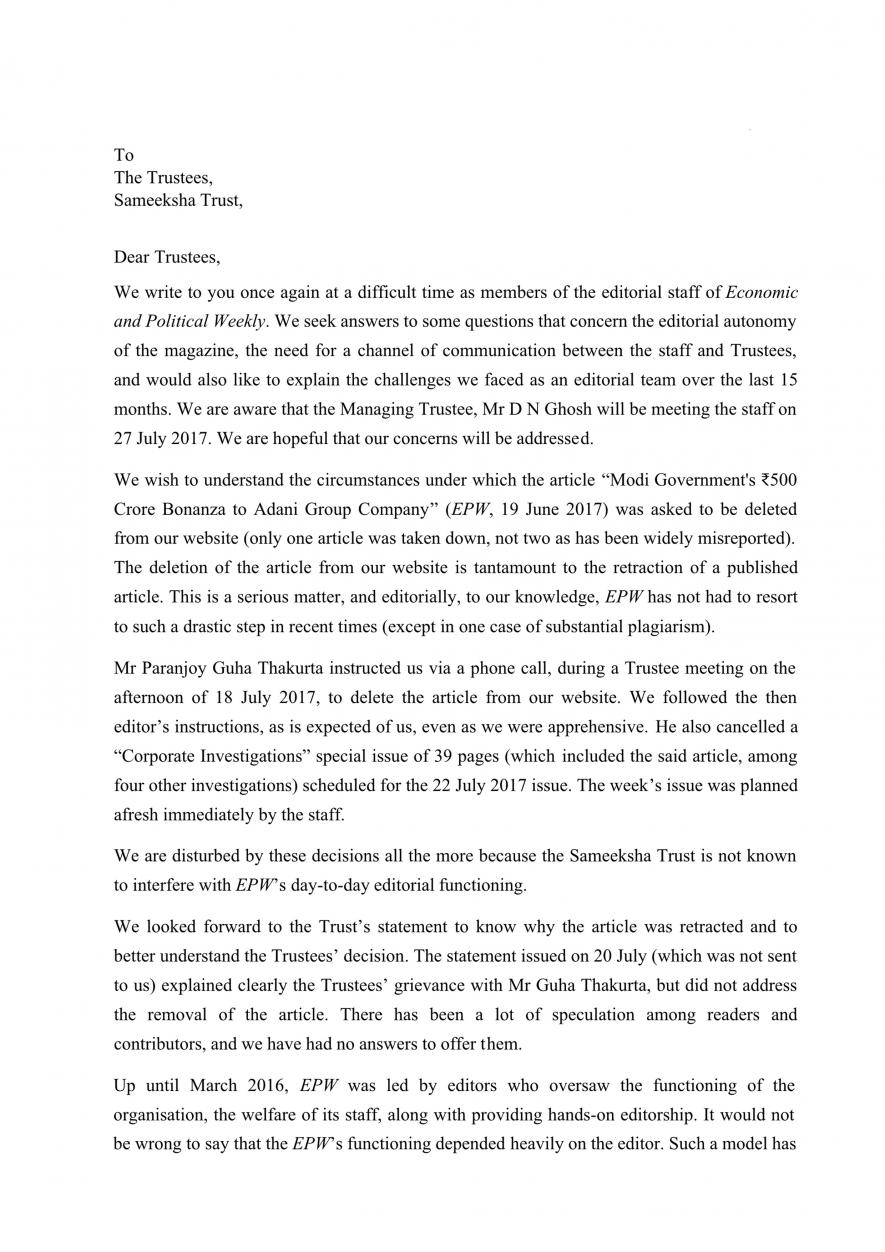
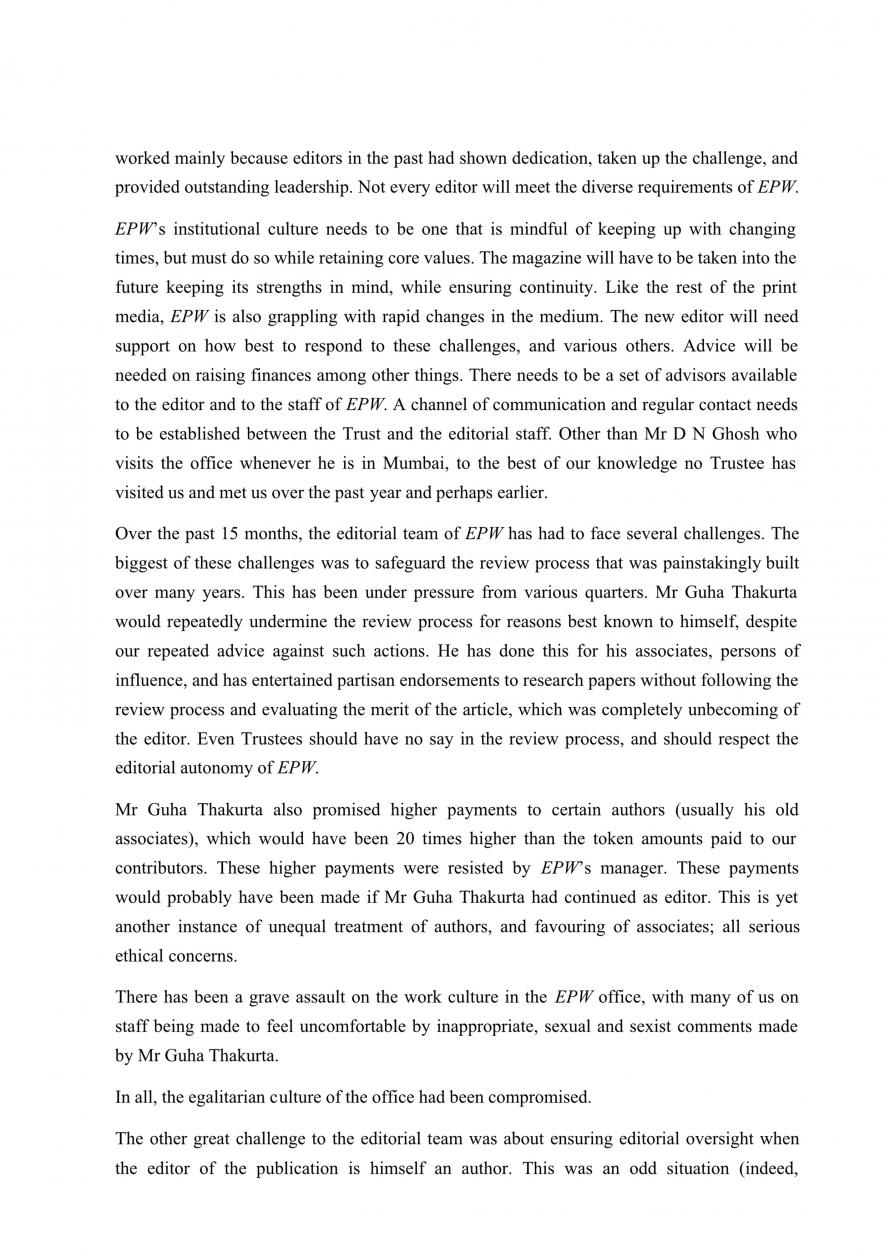
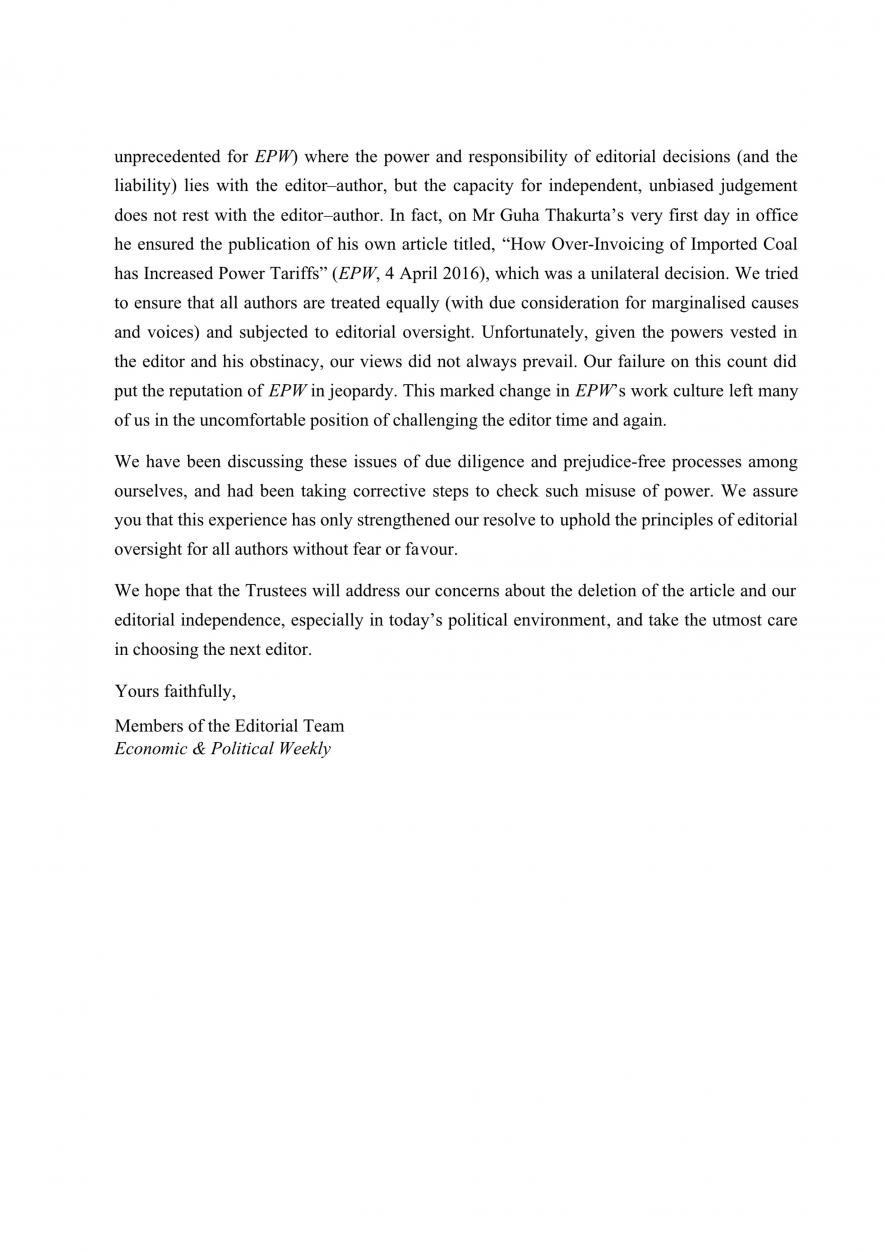
Get the latest reports & analysis with people's perspective on Protests, movements & deep analytical videos, discussions of the current affairs in your Telegram app. Subscribe to NewsClick's Telegram channel & get Real-Time updates on stories, as they get published on our website.









